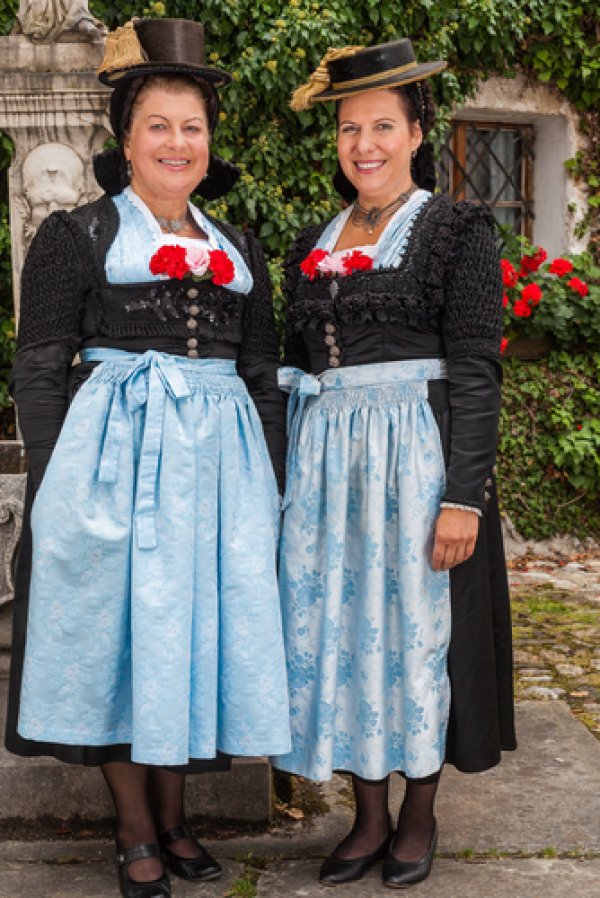Culture and Society: Women in Culture
General
Germans supposedly attribute to Kaiser Wilhelm II the description of the German woman’s purview as kirche (church), kinder (children) and kuche (kitchen). That definition, needless to say, severely discouraged women’s participation in many areas of Germany’s traditionally male-dominated culture through the majority of the 20th century. Things have changed since then, and German women today are becoming active participants in most areas of society.
Society treats women and girls in Germany, for the most part, on par with the men, though women are still primarily responsible for taking care of the household and rearing the children. Women enjoy almost equal representation as men in most areas of German society. However, many working pregnant women or mothers of newborn babies face discrimination in the workplace in the form of expectations that they stay at home and take care of the children. Social and economic status plays a relatively minor role in determining women’s opportunities in Germany.
With the government amending its laws to support women’s involvement in all areas of society, the role of German women is changing. Traditional discriminatory attitudes have increasingly become irrelevant, allowing most women the freedom to choose their careers and their spheres of participation in Germany’s public life.
In the political arena, women occupy about 30 percent of seats in Parliament. Angela Merkel became Germany’s first female Chancellor in 2005.
Statistically, Germany compares poorly to many European nations in terms of the number of women it actively employs in mid- to high-level management positions.
The role of women in urban and rural areas does not differ noticeably, with both making important contributions to Germany’s economy. The same applies to women from various social and economic classes in Germany.
Germany serves as home to many ethnic groups, such as the Gypsies, Sorbs, Danes and Frisians. The role of women in each of these individual ethnic groups differs according to their traditional customs and beliefs.
German women do not have dress code restrictions, and most of them follow western European styles of dressing.
Legal Rights
The German Constitution provides women with all the same legal rights as the men. This means they have the right to drive cars, own and inherit property, and vote—a right granted in 1918.
Laws permit abortions during the first 12 weeks of pregnancy in Germany, though they must be performed in a recognized hospital or healthcare center, and women must attend a pre-abortion counseling session.
Women in Germany can also initiate divorce proceedings. In the event of a divorce, women have equal rights in claiming custody of the children.
Education
German women enjoy equal access to education, with the female literacy rate standing at 99 percent, on par with the men.
Almost all German girls attend primary school and secondary school. German women make up a little over half of the entire student population at the university level, and outnumber men in some educational streams.
German boys and girls share the same classroom space, though schools in many large municipalities do not follow the co-educational system.
Educated German women have access to the same job opportunities as the men, though in reality, men far outnumber women in applying for most positions.
Dating, Marriage, and Family
German women choose their own spouses. Dating has become widely accepted, with the concept of arranged marriages almost non-existent. Women usually start dating in their early teens, and the most common venues for men and women to meet include educational institutions, social events, and bars.
The legal age for marriage is 16 years, though the law permits exceptions in unusual circumstances. Most Germans, however, marry in their late 20s to early 30s, with a career often taking precedence.
Most German women take their husband’s names after marriage, though they sometimes add it to their own, creating a double-barreled surname. In the event of a divorce, German women revert back to their maiden names.
Germany has a large number of single-parent families, and women often head these households. Women also have substantial influence in most family decisions. German women may legally hold assets separately from their husbands.
In a divorce, women have an equal share in the conjugal property as well as the right to claim custody of the children. The court usually makes the final decision on child custody.
Germany attaches no stigma to having no or few children. In fact, Germany has the highest rate of childlessness in the world.
Polygamy is neither legal nor socially acceptable in Germany, though German laws do recognize polygamous unions originating in countries where the practice is legal.
Health
Women enjoy the same access to health care as men. Germany’s very high standards of health care allow women all over the country easy access to many hospitals and healthcare centers.
The standards of medical care for German women prove excellent, and nearly all births take place in the presence of a skilled medical attendant. The maternal mortality rate is seven deaths per 100,000 live births and the infant mortality rate is three deaths per 1,000 live births.
German women do not need the consent of their spouses to make their own healthcare decisions.
Statistical sources include:
Inter-Parliamentary Union, Women in National Parliaments
US Central Intelligence Agency, World Factbook
World Bank, Databank
Article written for World Trade Press by World Trade Press Staff and reviewed by Kristina Reinsbach.
Copyright © 1993—2025 World Trade Press. All rights reserved.

 Germany
Germany 






